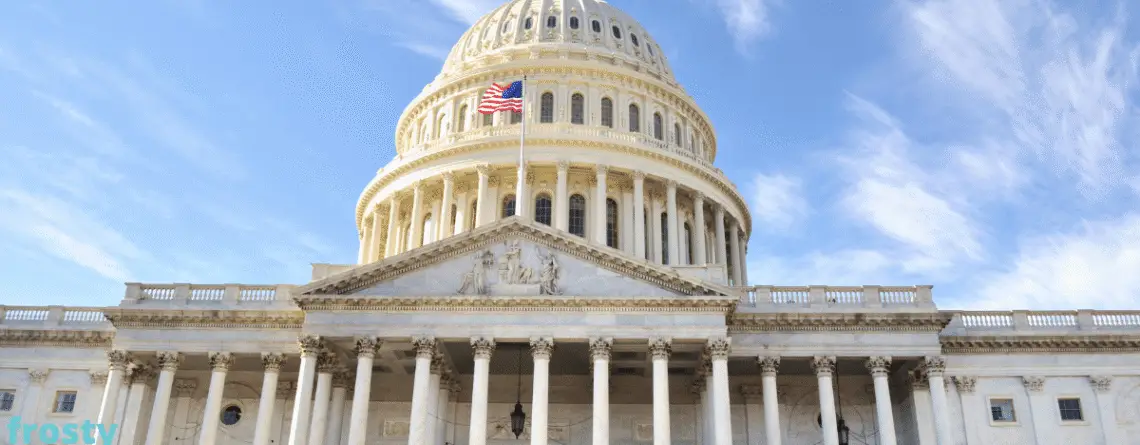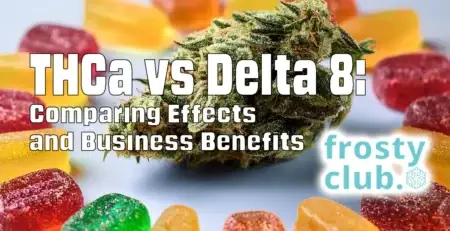
THCA Ban Passes: What Hemp Businesses Need to Know About 2026 and Beyond
Congress just voted to end the intoxicating hemp era. The 2026 Agricultural Appropriations Bill includes a THCA ban that gives businesses exactly one year before products with more than 0.4 milligrams of total THC per container become federally illegal.
That’s not a typo. Point four milligrams for an entire bottle, jar, or package. The bill is here, and it’s real.
But before you panic, there’s a 365-day grace period and a legitimate chance this gets blocked before it ever takes effect.
What Just Happened in Congress
The THCA ban isn’t a standalone bill. It’s buried in Section 781 of a massive spending package that keeps the government running. That’s how these things usually work. Major policy changes get attached to must-pass legislation because nobody wants to be blamed for a shutdown.
The New Product Categories and Limits
Here’s what the new law does. First, it maintains the 0.3% total THC limit for raw hemp. Nothing changes there.
But then it creates two new product categories with severe restrictions. Intermediate products sold business-to-business can’t exceed 0.3% of combined intoxicating cannabinoids. Final retail products get hit even harder with a 0.4 milligram per container limit.
Let’s put that in perspective. A typical THCA pre-roll contains 200 milligrams of THCA. A standard Delta-9 gummy has 10 milligrams. Under the new rules, your entire product container can have less than half a milligram total.
It’s not a regulation. It’s elimination.
What Gets Banned
The law also targets synthetic and semi-synthetic cannabinoids. That means Delta-8 made from CBD conversion is out. HHC is out. THC-P is out. Anything not naturally occurring in the plant or anything synthesized outside the plant loses its hemp status.
Then there’s the “similar effects” clause. This gives the Secretary of Health and Human Services authority to designate which cannabinoids have effects similar to THC.
How you market your products matters too. Call something relaxing or mood-enhancing? That could trigger the restriction even if the cannabinoid itself is mild.
The 365-Day Window Explained
The good news is nothing changes immediately. The bill includes a 365-day implementation period. From the date of enactment, businesses have exactly one year before enforcement begins.
During that year, current inventory remains legal. Retailers can sell through stock. Distributors can fulfill orders. Manufacturers can produce under existing rules.
This isn’t a small detail. A full year gives the industry time to adapt, lobby, and potentially reverse the restrictions. It also creates a clear timeline for businesses to make strategic decisions about inventory, reformulation, and market positioning.
FDA’s 90-Day Deadline
Within 90 days of enactment, the FDA must publish several critical lists. These include all naturally occurring cannabinoids in cannabis, all THC-class cannabinoids, and most importantly, all cannabinoids with similar effects to THC. That last list determines what counts against your limits. Until the FDA publishes it, nobody knows exactly which products survive.
State-Level Complications
State programs add another layer of complexity. Some states already banned THCA products before federal action. Others will need to align their hemp programs with the new federal baseline. A few might try to maintain more permissive rules, but that risks losing federal program approval. The 365-day window gives states time to update regulations and give businesses guidance.
Why There’s Still Hope for 2026
Industry insiders are cautiously optimistic that this ban never takes effect. Jonathan Miller, general counsel for the U.S. Hemp Roundtable, laid out a strategy in recent interviews. The target is the House Energy and Commerce Committee, which has jurisdiction over FDA regulation and hemp policy. That committee is chaired by Kentucky Republican Brett Guthrie.
The Kentucky Connection
Kentucky matters here. The state is one of the top three hemp producers in America. Hemp farmers, processors, and retailers represent significant economic and political power. Guthrie will face enormous pressure from constituents whose livelihoods depend on hemp commerce.
How Congress Can Block Implementation
There are several paths to blocking implementation. Congress could pass an appropriations rider prohibiting the use of federal funds to enforce the restrictions. That’s the fastest method and happens regularly with controversial regulations. Alternatively, lawmakers could pass a direct repeal of Section 781. Harder to achieve but cleaner. A third option involves extending the implementation timeline by another year or two, buying more time for lobbying and legal challenges.
The McConnell Factor
Then there’s the Mitch McConnell factor. The Kentucky senator who championed hemp legalization in 2018 reportedly pushed for this ban. But McConnell announced in February 2025 that he won’t seek reelection. His term ends in January 2027. He’ll be gone when the 2026 fight happens. That removes a major obstacle to reversal and shifts Kentucky’s political dynamics significantly.
Does blocking implementation seem likely? Hard to say. What’s clear is that the hemp industry has resources, motivation, and a full year to mount a serious legislative campaign. Trade groups are already mobilizing. Farmers are contacting representatives. State agriculture departments are weighing in. This isn’t over.
How We Got Here: A Brief History of Hemp
Understanding the THCA ban requires understanding how hemp became legal in the first place. Cannabis prohibition in America dates back to the 1937 Marijuana Tax Act, which effectively criminalized all cannabis including hemp varieties grown for fiber and seed. During World War II, the government briefly encouraged hemp farming through the “Hemp for Victory” campaign because imported fiber supplies were cut off. After the war, prohibition returned with full force.
The Path to Legalization
The modern hemp movement started gaining traction in the 1990s as states began exploring industrial applications. Kentucky led the charge under the leadership of then-Agriculture Commissioner James Comer and Senator Mitch McConnell. They argued that hemp could revitalize rural economies devastated by declining tobacco revenues. The 2014 Farm Bill created a limited pilot program allowing universities and state agriculture departments to research hemp cultivation.
That research program revealed something important. Hemp could be profitable without federal subsidies if farmers could access existing agricultural infrastructure. Banks, insurance companies, and mainstream supply chains needed clarity that hemp was legal, not a Schedule I controlled substance.
The 2018 Farm Bill and the THCA Loophole
The 2018 Farm Bill delivered that clarity. It defined hemp as cannabis containing no more than 0.3% Delta-9 THC on a dry weight basis. Anything above that threshold remained marijuana and stayed illegal. The 0.3% number came from a 1976 research paper by Canadian scientist Ernest Small, who admitted it was somewhat arbitrary.
What the 2018 Farm Bill didn’t anticipate was THCA. Raw cannabis flower contains THCA, not Delta-9 THC. THCA only converts to Delta-9 when heated through smoking, vaping, or cooking. Technically, high-THCA flower could test under 0.3% Delta-9 and still produce strong intoxicating effects after consumption. The loophole was accidental but profitable.
The Rise of Intoxicating Hemp
Within a few years, a massive market emerged for THCA flower, concentrates, and infused products. Smoke shops sold it legally. Gas stations carried it. Online retailers shipped it across state lines. For consumers in states without recreational marijuana programs, THCA offered legal access to intoxicating cannabis.
Law enforcement hated it. State regulators struggled with it. The DEA and FDA both issued warnings that they considered high-THCA products to be controlled substances, not legal hemp. Several states passed their own THCA bans. Meanwhile, the hemp industry split between those who wanted to preserve the loophole and those who feared it would trigger federal crackdowns that hurt the entire sector.
That brings us to November 2025 and the current THCA ban. Federal agencies finally got what they wanted. The question is whether they can keep it.
What Hemp Businesses Should Do Now
Treat the 365-day grace period as real. Don’t wait for a potential reversal that might not happen. Businesses need to plan for both scenarios at once.
For Retailers and Distributors
Audit your inventory right now. Calculate how much THCA and intoxicating hemp you’re holding. Develop a 12-month sales strategy to move that inventory while it’s still legal. Communicate clearly with customers. Tell them the truth about the timeline. Many will want to stock up, creating a surge in near-term demand. At the same time, start diversifying your product mix toward CBD-dominant, low-dose, and wellness-focused items that comply with the new limits.
For Manufacturers and Processors
Begin reformulation work immediately. Test different cannabinoid ratios to find the highest-performing products that stay under 0.4 milligrams per container. Investigate whether single-serving packaging makes economic sense. Update your testing protocols to measure total intoxicating cannabinoids, not just Delta-9 THC. Work with labs to establish comprehensive cannabinoid panels. Audit your supply chain to verify that all cannabinoids are plant-derived and document everything.
For Everyone in the Industry
Support industry lobbying efforts. Join trade organizations pushing for reversal or delay. Contact your representatives. Build economic impact data showing what the ban means for your business, your employees, and your community. Prepare for FDA guidance. The agency must publish its cannabinoid lists within 90 days. Those lists will determine which products survive and which don’t. Stay flexible until you see official guidance.
Your Questions Answered
Is all hemp illegal now?
No. Industrial hemp for fiber, seed, and grain remains fully legal. CBD products under 0.4 milligrams per container are fine. The THCA ban targets intoxicating hemp products, not the entire hemp industry.
Can I sell my existing inventory during the grace period?
Yes, for one year from enactment. However, watch your state regulations. Some states may be more restrictive or may prohibit sales of products that will soon be federally illegal. The grace period is federal. State rules vary.
What exactly counts as a container?
The innermost packaging that directly touches the product. A gummy jar is one container. A tincture bottle is one container. A pre-roll tube is one container. The 0.4mg limit applies to everything inside that container combined, not per serving or per piece.
Which cannabinoids have similar effects to THC?
Nobody knows yet. The FDA has 90 days to publish that list. Expect Delta-8, THC-P, and HHC to be included. CBN might make the list. The big unknown is how broadly they interpret “similar effects” and whether marketing claims alone can trigger inclusion.
Will this ban actually stick or get reversed?
It depends on the hemp industry’s lobbying effectiveness over the next year. There’s a legitimate path to blocking implementation through the House Energy and Commerce Committee. Kentucky’s political dynamics favor the industry, especially with McConnell retiring. But nothing is guaranteed. Plan for compliance while hoping for reversal.
What happens to businesses that don’t comply?
After the grace period ends, non-compliant products become controlled substances under federal law. That means potential DEA enforcement, criminal penalties, asset seizures, and loss of hemp licenses. State enforcement varies, but federal exposure is real. Don’t gamble with compliance.
Read the full bill: 2026 Agricultural Appropriations Bill – Hemp Provisions (PDF)
Frosty Club is monitoring the 2026 hemp landscape closely and will update our compliance guidance as the FDA publishes required information. For wholesale hemp inquiries and compliant product sourcing, reach out to our team.











